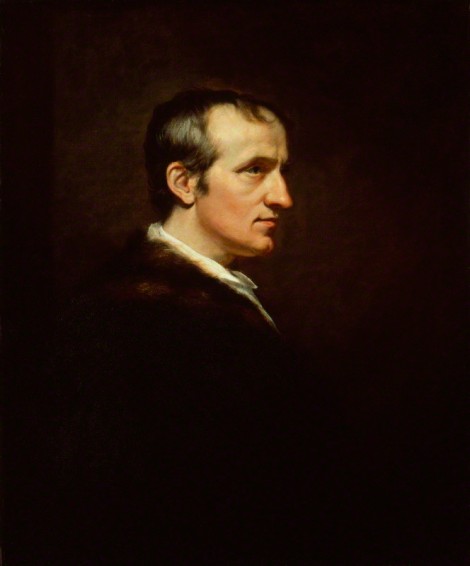This is the next installment of the “Anarchist Current,” my Afterword to Anarchism: A Documentary History of Libertarian Ideas, that appears in Volume Three: The New Anarchism (1974-2012). Here I discuss William Godwin’s philosophical anarchism in relation to the French Revolution (1789-1795). Previous installments dealt with Daoism and anarchism in ancient China, Etienne de la Boetie’s critique of voluntary servitude and the Diggers in the English Civil War, and anarchism in the French Revolution. Godwin’s companion was the early feminist, Mary Wollstonecraft, author of the Vindication of the Rights of Woman, and their daughter became Mary Shelley, author of Frankenstein and other literary works.
Godwin’s Critique of Coercion
Jean Varlet’s English contemporary, William Godwin (1756-1836), developed an anarchist critique not only of revolutionary violence but of coercion as such, whether the institutionalized coercion of the law with its penal systems, or the individual coercion of a parent toward a child. Godwin wrote and revised his great philosophical work, An Enquiry Concerning Political Justice (Volume One, Selection 4), during the French Revolution, publishing the final revised edition in 1797, around the time that Napoleon was coming to power, three years after the fall of Robespierre.
Godwin argued that coercion, and its positive correlate, inducements offered by those with wealth and power, distort political debate and moral discussion by causing people to evaluate a policy or course of conduct in terms of the punishments or rewards attached to them, rather than on their intrinsic merits. Coercion and inducements also have a debilitating effect on both persons in power and the people who obey or accept them.
“Dressed in the supine prerogatives of a master,” those in power are “excused from cultivating” their rational faculties. Those who are forced to obey their rulers become resentful and fearful. Instead of being encouraged to think for themselves, they learn how to avoid detection and seek power for themselves so that they can effect their own purposes.
The deleterious consequences of coercion and inducements are not surmounted by parliamentary debates, or what is now referred to as “deliberative democracy” (Dryzek, 2000). In the first place, the laws and policies of the government are not the result of direct debate among the people, but the result of the debates of elected representatives who represent particular interests. Decisions are made by majority vote of the representatives, who invariably vote along party lines. Even when a debate is not cut short by the ruling party, the “minority, after having exposed, with all the power and eloquence, and force of reasoning, of which they are capable, the injustice and folly of the measures adopted, are obliged… to assist in carrying them into execution,” since all the representatives are required to uphold the law. For Godwin, “nothing can more directly contribute to the deprivation of the human understanding and character” than to require people to act contrary to their own reason.
During parliamentary debates, which must come to a close with a vote of the assembled representatives, the “orator no longer enquires after permanent conviction, but transitory effect. He seeks to take advantage of our prejudices than to enlighten our judgement. That which might otherwise have been a scene of patient and beneficent enquiry is changed into wrangling, tumult and precipitation.”
This is particularly true during revolutionary upheavals. Reasoned and impartial debate “can scarcely be pursued when all the passions of man are afloat, and we are hourly under the strongest impressions of fear and hope, apprehension and desire, dejection and triumph.” Revolutions invariably provoke counter-revolution. When “we lay aside arguments, and have recourse to the sword,” amidst “the barbarous rage of war, and the clamorous din of civil contention, who shall tell whether the event will be prosperous or adverse? The consequence may be the riveting on us anew the chains of despotism.” To combat the counter-revolution, the revolutionaries suppress freedom of expression and resort to terror, organizing “a government tenfold more encroaching in its principles and terrible in its proceedings” than the old regime.
Despite regarding revolutions as being “necessarily attended with many circumstances worthy of our disapprobation,” Godwin recognized that “revolutions and violence have too often been coeval with important changes of the social system.” While we should “endeavour to prevent violence,” during revolutionary upheavals we cannot simply “turn away our eyes from human affairs in disgust, and refuse to contribute our labours and attention to the general weal.” Rather, we must take “proper advantage of circumstances as they arise, and not… withdraw ourselves because everything is not conducted according to our ideas of propriety.” Godwin’s critique of revolutionary violence must not therefore be misconstrued as tacit support for the injustices which the revolutionaries are seeking to overturn.
Since Godwin’s time, anarchists have continued to struggle with questions regarding recourse to violence and the role of anarchists during revolutionary struggles. The validity of Godwin’s warning, based on his own observations of the French Revolution, that revolution may result in a new tyranny because it is the strongest and not the most just who typically triumph, has been borne out by the experience of anarchists in subsequent revolutions. In the 20th century, both the Russian (Volume One, Chapter 18) and Spanish (Volume One, Chapter 23) revolutions resulted in dictatorships even more “ghastly” than that of Robespierre, despite the presence of significant anarchist movements.
When anarchist movements began to emerge in 19th century Europe, Godwin’s work was relatively unknown. It was largely through the work of the anarchist historian, Max Nettlau (1865-1944), that the ideas of de la Boétie and Godwin were introduced to European anarchists, well after anarchism had emerged as an identifiable current of thought (Walter, 2007).
Robert Graham
Additional References
Dryzek, John S. Deliberative Democracy and Beyond. Oxford: Oxford University Press, 2000.
Nettlau, Max. A Short History of Anarchism. London: Freedom Press, 1996.
Walter, Nicolas. The Anarchist Past and Other Essays. Nottingham: Five Leaves Publications, 2007.



Reblogged this on Fahrenheit 451 Used Books and commented:
Left Wing Books, Blogs, Video’s fah451bks.wordpress.com Leadership, Education, Solidarity, Struggle, Sacrifice